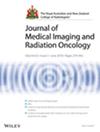Safety and Efficacy of Selective Internal Radiation Therapy for Portal Vein Tumour Thrombus in Advanced Hepatocellular Carcinoma: A Single-Centre Experience in Australia
Abstract
Introduction
Portal vein tumour thrombus (PVTT) is a common complication of hepatocellular carcinoma (HCC) and has a poor prognosis. Selective internal radiation therapy (SIRT) with Yttrium-90 (Y90) microspheres is a minimally invasive treatment option that has shown promise in treating PVTT. Studies have suggested a survival advantage of SIRT in this population, but data in the Australasian population are lacking. The aim of this study was to evaluate the safety and efficacy of SIRT in a series of patients at an Australian hospital with advanced HCC and PVTT.
Method
All patients underwent pre-treatment imaging with MRI or CT, and immediate post-treatment imaging with Y90 PET CT and MRIs at 3-, 6-, 9- and 12-months. The primary endpoints were time to progression (TTP) and overall survival (OS) post-SIRT. The secondary endpoint was safety.
Results
Of the 698 patients who underwent SIRT at our institution between 2007 and 2023, 64 patients had HCC and PVTT. 59/64 (92%) were male, with a median age of 61 years (range 37–86 years). The majority of patients had Child–Pugh a cirrhosis (87%), and the majority were ECOG 0 (91%). The majority had main PVTT at the time of SIRT. All patients underwent SIRT with Y90-coated resin microspheres (SIR-Spheres, Sirtex Medical, Australia). Personalised dosimetry planning was performed by the treating interventional radiologist. SIRT was well tolerated by most patients, with major complications reported in a minority of cases (19/64 patients had an episode of biochemical decompensation within 90 days following treatment). The median TTP was 4.8 months (range 1–48 months). The median OS was 11.5 months (range 1–80 months), with those with a favourable MAAPE score having a median OS of 21.2 months (12.6–29.7 months).
Conclusions
Our cohort suggests that SIRT is a safe and effective treatment option for a difficult-to-treat patient population. Our data suggest a longer OS for those with preserved liver function, good functional status and low AFP levels at 21.2 months. Poor pre-treatment liver function and functional status are predictors of decompensation, and decompensation is a predictor of poor survival. These data provide an Australasian perspective and support the expanding role of SIRT in HCC treatment guidelines. Further prospective studies with larger sample sizes and longer follow-up are warranted to confirm these findings.

 求助内容:
求助内容: 应助结果提醒方式:
应助结果提醒方式:


